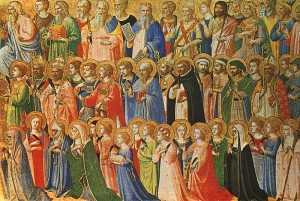 The Holy Scriptures contain examples of simple, even lowly men and women, who said a heroic yes to God. And always it cost them dear.
The Holy Scriptures contain examples of simple, even lowly men and women, who said a heroic yes to God. And always it cost them dear.
Think of the humiliation Noah underwent as he built that ark and his neighbors laughed at him. Think of Moses who at age 80 was called away from home and family to confront a Pharaoh who scorned him and then contend for forty long years with a stiff-necked and stubborn people, his own fellow Israelites. Think of the courage of Esther or Judith who risked their lives to protect their own people. Think of the prophets called by God from their comfortable or secure lives to be His spokesmen, earning them the hatred of kings and princes, and the fear of the ruling classes.
Even the great King David of whom we hear in the first reading was but a lowly shepherd boy, the youngest of his family, the runt of the litter. And Saint Paul who writes so eloquently of the mysteries of our faith was a fierce persecutor of Christians, the last person expected to become an ambassador of the One he hated. Indeed, Saint Paul called himself the “least” of all the Apostles!
And so we come to Mary of Nazareth, a virgin betrothed to a carpenter named Joseph. Why Mary? What special gifts or talents prepared her to be the mother of the God-made-man? Absolutely none of her own doing! It was God’s intervention that preserved her from the stain of Original Sin; neither Mary nor her parents, Joachim and Anne, can take any credit for this. It was pure grace, pure gift.
My brothers and sisters, if Christmas teaches us anything, it is this lesson: namely, that God chooses the weak and makes them strong, as St. Paul would one day write; that God chooses the foolish and lowly in the sight of this world, not the worldly wise and the high and mighty, to accomplish His plan. How true are Our Lord’s words that unless we become like little children, God can have no part of us and we will never learn the truth about God.
However, this is not a lesson that simply belongs to the past, to the days of a David or Isaiah or Mary or Joseph. It is true to this very day.
Look around you. Who supports the true meaning of Christmas? Who upholds the truth that God created us at the moment we were conceived? Who protects the dignity of life, even when marred by suffering or disability? Who defends marriage, not as the state’s invention, but as God’s creation? Who supports the true meaning and purpose of human sexuality? Not many of our elected officials or appointed judges, not many of the very wealthy or powerful. But why are we surprised? So it has been and ever will be! The lesson of Christmas is that whether we are lowly shepherds or high-born, wealthy, learned Magi, we are called to become humble and pay our ultimate homage, not to a constitution or a philosophy or a judicial decree, but to a babe — to a person Who is God with us, Emmanuel. The shepherds and the Magi prostrated before what they did not completely understand but profoundly believed.
How sad it is that in the name of tolerance we are forbidden to demonstrate our beliefs or exhibit our religious symbols on public property that our taxes pay for! How absurd that in order to display a Christmas crèche on our public land we must pollute it with mythical figures and tasteless decorations! How frightening it is that the name of Jesus cannot be uttered in our public schools for which we — not the state — pay, or that words and symbols have to be expunged from our public buildings or properties because they happen to appear in a book called the Bible.
For too long too many Catholics have subscribed to the myth that we can make heaven out of earth if only we learn not to offend others. Do you think for one moment it is God’s plan that we not stand up for what we believe? If it were, would Jesus have been crucified, Paul beheaded, Bartholomew flayed alive, the virgins Agnes, Agatha, Anastasia, and Cecilia executed? Would Christians have marched into the Coliseum singing hymns as they were devoured by wild beasts? Would Boniface have gone to Germany, Patrick to Ireland, Augustine to England, Cyril and Methodius to Eastern Europe, Francis Xavier to India and Japan? What would the martyrs of Uganda, Vietnam, China, Japan, North America, Spain and Mexico think if we failed to be inspired by their example of heroic and uncompromising witness? If we truly believe in Christmas, that God sent the one and only Savior of the world to the world, then are we not obliged to spread this message and to defend this truth?
Next Sunday, we will celebrate the Solemnity of the Incarnation, Christmas. We will proclaim that God so loved the world that He sent His only begotten Son, but He sent Him unplanned, unwanted and unwelcomed: Unplanned by Mary, unwanted by Joseph, unwelcomed by Herod. Why then should any of us be surprised if the message we proclaim two thousand years later is still unwanted or unwelcomed? After all, if it was true for God, should it not be true for us? We could do no better than make our own the words of Mary in today’s Gospel: “Behold, I am the servant of the Lord. May it be done to me according to your word.”
[This homily was given on December 18, 2011, the Fourth Sunday of Advent at Our Lady of Mercy Parish in East Greenwich, RI.]



